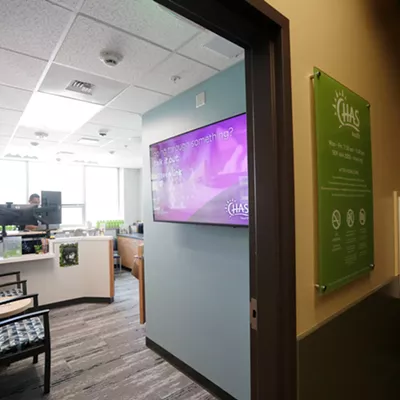MACHINE'S BEST FRIEND
In the Idaho legislature, "historical horse race" machines had few friends. The state legalized the machines in 2013 to prop up the struggling horse racing industry, with the understanding that they would simulate wagering on historical horse races. But many legislators were peeved when it turned out the machines bore a striking resemblance to slot machines, complete with spinning wheels of cherries and treasure chests.
This year, after complaints from area tribes, the Idaho Senate and the House voted overwhelmingly to repeal the bill and make the machines illegal.
But when it landed on the desk of Idaho Gov. C.L. "Butch" Otter, he pulled out his VETO pen. In some ways, his veto isn't a surprise. The legislation had been fervently opposed by ranchers. Otter, who wears boots and a cowboy hat, lives on a ranch. And as reported by the Spokesman-Review, the machine operators donated more than $92,000 to Otter.
"In my view, a precious part of Western culture is at stake," Otter wrote in his veto message.
While the Idaho Senate failed to override the veto, the body raised another question: Was the veto even legal? The Idaho constitution requires the governor to return vetoed bills to the legislature within five days (not counting Sundays). The Senate claims it only received the vetoed bill on Monday, after the deadline passed, an apparent violation of the law.
The governor's staff pointed out that when Otter vetoed the bill on Friday, the Senate already had adjourned for the Easter weekend. "There was nobody upstairs to deliver it to," spokesman Jon Hanian says. Expect litigation. (DANIEL WALTERS)
ULTIMATUM
A U.S. District judge ruled last week that Washington state violates the constitutional rights of offenders with mental health issues who wait more than seven days for evaluation and treatment.
Offenders in Washington currently wait weeks, even months, before they're seen by a doctor after a court-ordered MENTAL HEALTH evaluation, which delays trial dates and can worsen their condition.
Judge Marsha Pechman has given the state nine months to comply with her decision, which means hiring more staff and making room for the influx of patients. She also will appoint a monitor to make sure things are going smoothly, since the state has ignored previous court orders.
Spokane public defender Kari Reardon says that almost all of her clients are impacted by prolonged wait times. She calls the decision "tremendous" and "a first step in something that needed to be addressed."
The only downside, Reardon points out, is the cost to the Department of Social and Human Services, the agency responsible for overseeing mental health evaluations. But, as she and the court decision acknowledge, constitutional rights are guaranteed to all people, regardless of how much it costs. (MITCH RYALS)
GOOD NEWS/BAD NEWS
The phones at the Idaho SUICIDE PREVENTION Hotline are ringing off the hook this year. Since Jan. 1, they've received 1,377 calls. That's 378 more calls than the hotline received in the entirety of 2013.
The hotline currently has 60 volunteers — with two or three of them and a licensed clinician fielding calls 24 hours a day. They plan to add 20 more by the end of May. "About half the calls, the person is having some form of suicidal ideation," says Volunteer Coordinator Nina Leary. The other calls come from people experiencing non-life-threatening crises.
The National Suicide Prevention Lifeline toll-free number (1-800-273-8255) is a suicide hotline in name but a crisis line in practice, says Leary. Around 30 percent of the calls are critical, with a volunteer keeping the caller on the line until help — in the form of a mental health crisis team, emergency services or police — arrives. In rural Idaho, this can take a long time.
Leary says the uptick in calls is a good thing. It reflects increased awareness, not increased thoughts of suicide, in the state with the sixth highest suicide rate. An AmeriCorps volunteer has been working full time to get the word out, and hotline ambassadors are doing outreach at community events. (LAEL HENTERLY)




























